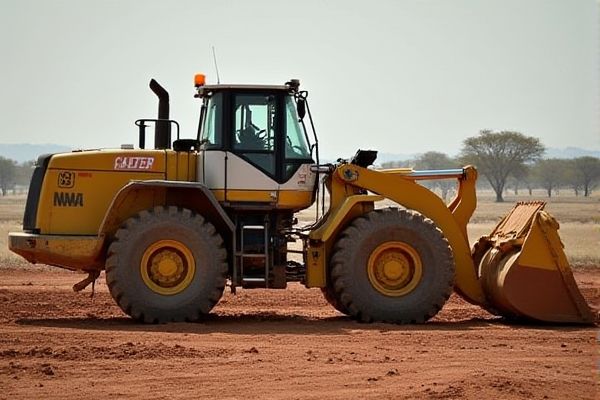
Heavy equipment repair positions within non-governmental organizations (NGOs) in Zambia offer a range of opportunities for skilled technicians and mechanics. These roles often focus on maintaining and repairing machinery used in various development projects, including agriculture, construction, and infrastructure. NGOs typically seek professionals with experience in heavy machinery, electrical systems, and troubleshooting skills to ensure that equipment operates efficiently in challenging environments. Working with NGOs can provide not only competitive compensation but also the chance to contribute to meaningful community development initiatives.
Job Description
Heavy equipment repair jobs in Zambia involve diagnosing and fixing mechanical issues in machinery used for construction, mining, and agriculture. Technicians are responsible for routine maintenance, troubleshooting electrical and hydraulic systems, and ensuring equipment complies with safety standards. Proficiency in using diagnostic tools and a strong understanding of equipment specifications are essential for success in this role. This position often requires collaboration with other technicians and engineers to maximize equipment performance and minimize downtime.
Requirement
In Zambia, NGO heavy equipment repair jobs typically require a strong background in mechanics, particularly with heavy machinery such as excavators, bulldozers, and cranes. Employers often seek candidates with formal training in mechanical engineering or related fields, along with practical experience in equipment maintenance and repair. Familiarity with safety protocols and preventive maintenance procedures is crucial to ensure equipment reliability and operational efficiency. You may enhance your prospects by showcasing problem-solving skills and the ability to work in diverse field environments.
Salary and Perks Expected
In Zambia, NGO heavy equipment repair jobs often offer competitive salaries that can vary based on experience and specific roles. Entry-level positions may start at a range of $1,000 to $1,500 per month, while skilled technicians can earn upwards of $2,500. Perks may include health insurance, allowances for transportation, and opportunities for professional development. Working in this field not only contributes to local community development but also provides valuable skills that enhance your employability.
Similar Job Names
- Heavy Equipment Mechanic
- Heavy Equipment Technician
- Equipment Maintenance Supervisor
- Workshop Manager
- Fleet Maintenance Coordinator
- Diesel Mechanic
- Repair Technician
- Heavy Machinery Inspector
- Heavy Equipment Operator
- Mechanical Engineer
- Equipment Service Manager
- Parts Specialist
- Hydraulic Technician
- Electrical Technician
- Equipment Failure Analyst
Job Expectation Concept
In Zambia, NGO heavy equipment repair jobs typically require a combination of technical skills and a strong understanding of equipment maintenance. Employers seek individuals who can diagnose and repair various types of machinery, including excavators, bulldozers, and generators, essential for infrastructure development. Training and certification in mechanical engineering or a related field can enhance your job prospects in this sector. Understanding local challenges and sustainability practices can also be an advantage, enabling you to contribute effectively to project goals.
Career Advantage and Weakness
NGO heavy equipment repair jobs in Zambia offer unique career advantages, including opportunities for skill development and exposure to diverse projects that contribute to community development. Working within non-governmental organizations allows individuals to engage with a variety of heavy machinery, enhancing technical proficiency and problem-solving abilities critical in this field. Job roles often provide a sense of purpose, as your work directly impacts local infrastructure and supports humanitarian efforts. However, challenges may include limited resources, which can affect job stability and access to advanced training programs.
Important Thing Must Know
In Zambia, NGO heavy equipment repair jobs play a crucial role in supporting infrastructure development and humanitarian efforts. Skilled technicians are in demand to ensure the functionality and longevity of heavy machinery used in various projects, such as road construction and agricultural initiatives. Employment in this field often involves working in challenging environments, requiring a strong commitment to safety and technical expertise. You may find opportunities with organizations that provide training and resources, fostering personal and professional growth. Understanding the local context and cultural practices is essential for effectively contributing to these projects and making a meaningful impact.
Alternative Career Options
Heavy equipment repair jobs in Zambia offer a solid foundation for exploring alternative career options. Skills in diagnosing and servicing machinery can translate well into roles such as equipment sales, where you can leverage your technical knowledge to advise customers. Another promising field is equipment maintenance management, focusing on overseeing repair teams and ensuring operational excellence. Broadening your expertise to include renewable energy technologies can also open doors to exciting opportunities in Zambia's growing green sector.
Companies List
- Zambia Railways Limited
- Copperbelt Energy Corporation
- First Quantum Minerals
- Konkola Copper Mines
- Zambezi River Authority
- Mopani Copper Mines
- Zambian National Commercial Bank
- Dola Hill Project
- Zambia Airports Corporation
- Atlas Copco Zambia Ltd
List of Ideal City
Lusaka, the capital city of Zambia, serves as a central hub for NGO activities, offering numerous opportunities in heavy equipment repair. Ndola, known for its industrial background, frequently requires skilled technicians for various NGOs involved in infrastructure and development projects. Kitwe, one of the largest cities, hosts several organizations focused on improving agricultural and mining equipment, necessitating a steady demand for repair services. Living in these cities allows you to engage with meaningful work while contributing to community development through essential equipment maintenance.
 zambia-jobs.com
zambia-jobs.com